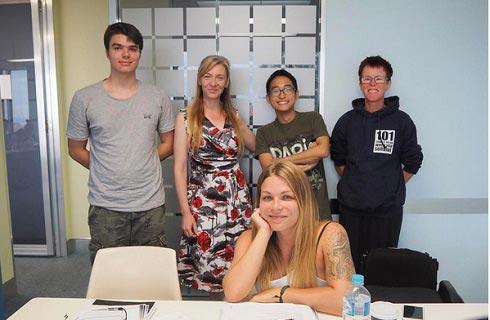Doctor of Philosophy in Psychology - Cognitive Sciences

学历文凭
Ph.D.

专业院系
Psychology

开学时间

课程时长

课程学费

国际学生入学条件
In addition to the general requirements of the College of Arts and Sciences, the Department of Psychology has the following requirements:
Applicants are expected to have a background in psychology, although an undergraduate major is not required. A minimum of four courses is required: psychological statistics, a course in research methods in psychology, plus two or more content courses in psychology at the junior or senior level. It is recommended that applicants to the clinical program take abnormal psychology as one of the content courses.
The applicant must submit scores that are well above average on the general test of the Graduate Record Examination.
A student in possession of a graduate degree or coursework who is admitted to graduate study may be accorded advanced standing after an evaluation of previous graduate work. The evaluation ordinarily will be conducted during the first semester of enrollment. If the student’s previous graduate work did not include courses equivalent to the required core courses and a thesis, these will be required. Students given full credit for master’s work elsewhere will have one year in which to complete all work stipulated as conditions of admission or transfer of credit.
Each student must fill out the Supplementary Form for Graduate Study in Psychology.
IDP—雅思考试联合主办方

雅思考试总分
6.0
- 雅思总分:6
- 托福网考总分:60
- 托福笔试总分:160
- 其他语言考试:NA
CRICOS代码:
申请截止日期: 请与IDP联系 以获取详细信息。
课程简介
The Cognitive Sciences program area oversees the Cognitive Sciences (CGS) concentration, which encompasses interdisciplinary interests in experimental psychology, neuroscience, philosophy, computer science and translational science. With cognition as its unifying thread, the program area provides opportunities to specialize in research and training in basic or applied cognitive psychology, cognitive neuroscience, social cognition, language and cognitive development, psycholinguistics and comparative cognition.<br><br>The research methods include noninvasive behavioral and cognitive testing with children, adults, and non-human primates, as well as electroencephalography (EEG), magnetic resonance imaging (MRI and fMRI), transcranial magnetic stimulation (TMS), diffusion tensor imaging (DTI), eye-tracking, virtual reality/virtual environment testing, neurogenomics and cognitive neuroinformatics.<br><br>We accept students with wide-ranging interests across the cognitive sciences for the terminal PhD program. Students shape their own programs of research in consultation with their advisors. Prospective applicants should contact faculty for more information about individual research programs.<br><br>Specific faculty interests include learning and memory, language acquisition and use, including the roles of experience, gesture, specific brain structures and processes, economic decision making, attention and executive functioning (e.g., metacognition, planning, cognitive control), false memories and eyewitness accuracy, decision making, including speeded judgments, economic decision making, and reasoning, inequity perception and response, comparative cognition, individual and group (e.g., species, race, gender, diagnostic category, age) differences, cooperation and prosocial behavior, and brain-behavior relations that underlie various cognitive competencies.
相关申请
 预科
预科 奖学金
奖学金 实习机会
实习机会 在校学习
在校学习 跨境学习
跨境学习 校园授课-线上开始
校园授课-线上开始 在线/远程学习
在线/远程学习
开学时间&学费
学费信息仅供参考,请与IDP联系以获取详细信息
| 开学时间 | 时长 | 学费 | 地点 |
|---|
学校排名

世界排名401
数据源:
泰晤士高等教育世界大学排名
本校相关课程

语言交流文学学士
学历文凭
Bachelor Degree
开学日期
课程费用总额


妇女,性别和性研究文学学士学位
学历文凭
Bachelor Degree
开学日期
课程费用总额


社会学文学学士
学历文凭
Bachelor Degree
开学日期
课程费用总额


社会工作学士
学历文凭
Bachelor Degree
开学日期
课程费用总额


风险管理与保险业务管理学士学位
学历文凭
Bachelor Degree
开学日期
课程费用总额


呼吸疗法理学学士
学历文凭
Bachelor Degree
开学日期
课程费用总额

其他相关课程

认知科学文学士
 西蒙菲莎大学
西蒙菲莎大学学历文凭
Bachelor Degree
开学日期
课程费用总额


认知科学(荣誉)文学士学位
 约克大学
约克大学学历文凭
Bachelor Degree with Honours
开学日期
课程费用总额


认知系统科学学士学位
 不列颠哥伦比亚大学
不列颠哥伦比亚大学学历文凭
Bachelor Degree
开学日期
课程费用总额


认知系统文学士学位
 不列颠哥伦比亚大学
不列颠哥伦比亚大学学历文凭
Bachelor Degree
开学日期
课程费用总额


神经科学与应用认知科学理学硕士
 圭尔夫大学
圭尔夫大学学历文凭
Masters Degree
开学日期
课程费用总额


荣誉科学理学士学位(科学)
 多伦多大学
多伦多大学学历文凭
Bachelor Degree with Honours
开学日期
课程费用总额










 美国
美国
